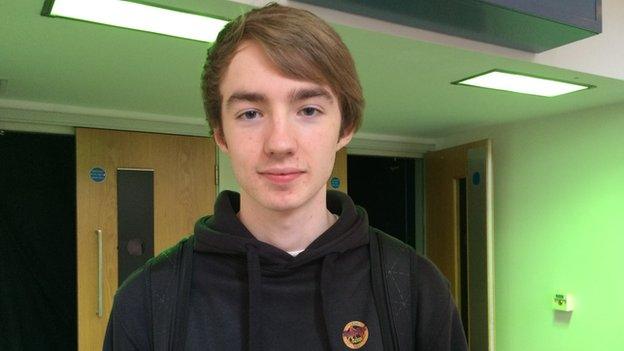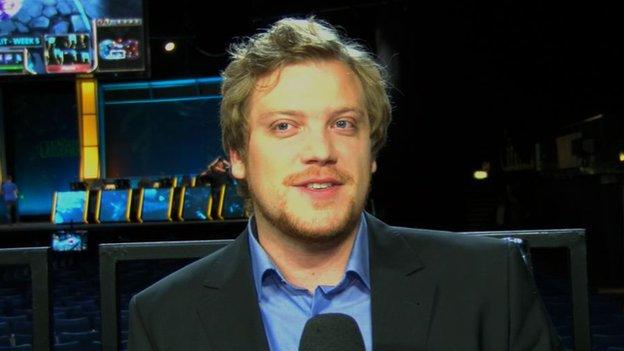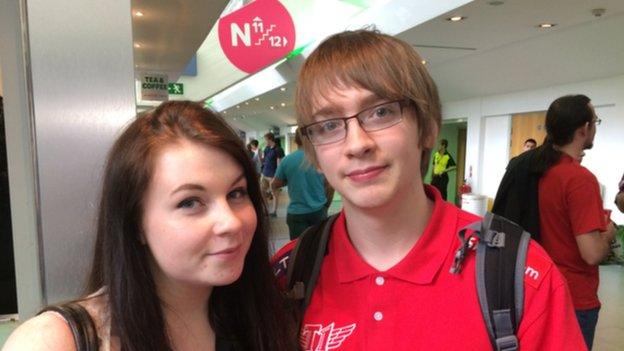Can more British people become professional gamers?
- Published
League of Legends hits Wembley
There's a hush around Wembley Arena as thousands of eyes concentrate on the developing action.
A small group of fans towards the back of the crowd chant, "Who are you? Who are you?"
Then there's a sudden collective gasp, a rising roar, which breaks into an enormous cheer and enthusiastic applause.
"Red team has slain the dragon," flashes the message on an enormous screen.
Welcome to one of the biggest ever e-sports shows in the UK - the League of Legends LCS Championship.
The amount of money dished out for playing video games has tripled in the last five years, according to the website esportsearnings.com, external.
It's likely to rise again this year as the prize money for next month's Dota 2 International tournament in Seattle has already hit $9 million (£5.2m).

Competitive gaming has been big business for years in places like South Korea and the US, where superstar players earn hundreds of thousands of pounds.
But there aren't many Brits among those top earners, and the boss of one team has told Newsbeat that Britain is still "lagging behind" when it comes to e-sports.
Last weekend more than 10,000 fans packed into Wembley Arena over two days to watch the European round of the League of Legends LCS Championship.
In the US, League of Legends players have been offered athlete visas and can apply for college scholarships.
So what's the future for e-sports in the UK?
The pro

To his family, he's 19-year-old Matt Taylor from Somerset.
To his fans, he's Impaler, a member of the Supa Hot Crew.
Matt left university to move to Germany to play League of Legends full-time.
He describes playing at Wembley as "literally living the dream", but accepts that dream might not last forever.
"Generally careers in e-sports last three to four years, but after that you can coach or manage a team, or try to work for Riot," he said.
"Right now I'm earning enough to consider it a job and making a decent amount of money, but eventually I will go back to uni."
The caster

Joe Miller commentates for the LCS. Casters, as they're known, are an important part of the e-sports scene.
Speaking to Newsbeat at Wembley, the 26-year-old from Rotherham said: "I've done a few events in England which have had 20 to 200 people in the audience, so this is the first time we've seen e-sports really blow up."
Joe agrees with Matt that UK gamers tend to prefer consoles to PCs, and this has held back e-sports in the UK.
The British e-sports community ESL says it has 100,000 users in the UK and that figure is continuing to grow.
The boss
Michael O'Dell runs Team Dignitas from Surrey, but his highly paid stars are mostly American.
He says his top players will earn up to $100,000 (£60,000) this year.
Michael spends most of his time looking for the next generation of British talent, but says that's not easy.
"I think we're lagging behind - not that much - but we need to do some catching up and hopefully that will come with education."
The fans

Gaming streaming site Twitch has told Newsbeat it now has more than two million active users in the UK.
Most are watching other people play games, but an increasing number are streaming their own games in the hope of attracting viewers.
Charlotte Hughes, 18, and Sam Teasdale, 20, travelled from the north west of England to see League of Legends at Wembley.
"When I tried to explain it to my parents they didn't get it," says Sam.
"It's not just a game any more. We're paying to see these players just like any other sport.
"I don't know how far it'll go in the UK, but this is definitely a step in the right direction."
Follow @BBCNewsbeat, external on Twitter and Radio1Newsbeat, external on YouTube